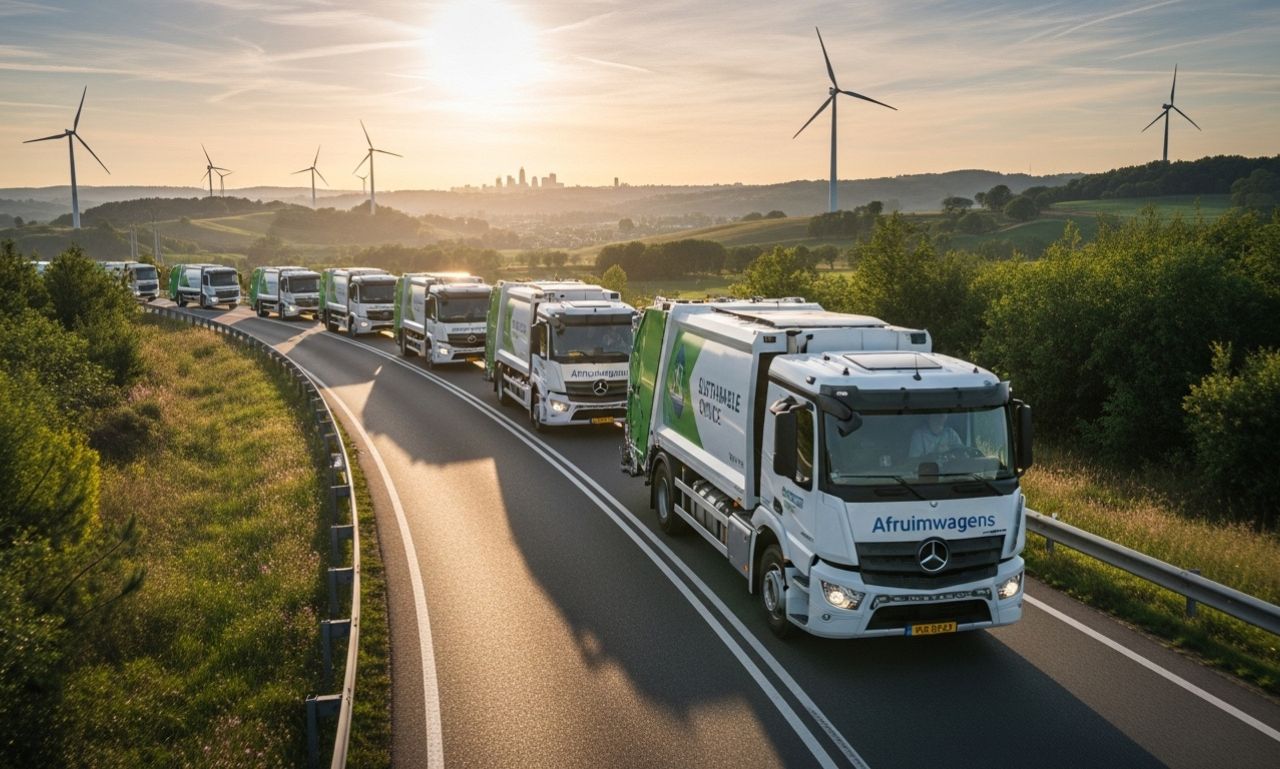As we navigate through an era defined by rapid technological advancements and growing environmental concerns, the search for sustainable transportation solutions has never been more pressing. Enter afruimwagens—a groundbreaking innovation that promises to revolutionize how we think about travel and logistics. These vehicles not only challenge conventional modes of transport but also pave the way toward a greener future. Whether you’re commuting to work or transporting goods across cities, afruimwagens are emerging as a practical choice for those looking to minimize their carbon footprint while enjoying modern conveniences. Let’s delve into what makes afruimwagens stand out in today’s fast-paced world!
What is Afruimwagens?
Afruimwagens represent a breakthrough in eco-friendly transportation. These vehicles are designed to minimize environmental impact while providing efficient mobility solutions.
Constructed with sustainable materials, Afruimwagens prioritize renewable resources. They often utilize electric or hybrid technologies, reducing reliance on fossil fuels.
Additionally, these innovative vans can serve various purposes—from goods transport to personal use—making them versatile for both businesses and individuals alike.
The design emphasizes durability and longevity, ensuring that they not only reduce waste but also offer long-term value.
As urban areas become increasingly congested, Afruimwagens emerge as a practical response to modern transportation challenges. Their ability to navigate tight spaces makes them ideal for city living.
With the growing awareness of climate change, more people are considering Afruimwagens as a forward-thinking choice in daily travel options.
The Environmental Impact of Traditional Transportation Methods
Traditional transportation methods heavily rely on fossil fuels. This dependence contributes to significant greenhouse gas emissions. These emissions are a major driver of climate change.
Road vehicles, trains, and airplanes emit carbon dioxide and other pollutants into the atmosphere. They degrade air quality in urban areas, leading to health problems for residents. Cities struggle with smog and respiratory illnesses as a result.
Moreover, traditional transport infrastructure often disrupts natural habitats. Building roads and railways can lead to deforestation and loss of biodiversity. Wildlife is frequently displaced or killed due to these developments.
Additionally, noise pollution from vehicles affects both humans and animals alike. The constant hum of traffic can interfere with communication among wildlife species.
The environmental consequences extend beyond just air quality issues. Water sources also face contamination from runoff related to road maintenance and vehicle wear-and-tear products like oil or tires breaking down into microplastics.
How Afruimwagens Address Sustainability Issues
Afruimwagens offer a transformative solution to sustainability challenges in transportation. These vehicles are designed primarily with eco-friendly materials, significantly reducing their carbon footprint.
Their energy-efficient designs utilize renewable resources, making them a viable alternative to traditional fossil fuel-powered options. By harnessing solar power and sustainable electricity sources, Afruimwagens decrease reliance on non-renewable energy.
Moreover, the lifespan of these vehicles is extended through easily replaceable components. This reduces waste and encourages recycling practices within the transportation sector.
Additionally, Afruimwagens promote urban mobility while minimizing traffic congestion. Their compact size allows for efficient use of space in crowded cities, supporting greener living environments.
Adopting Afruimwagens can lead to cleaner air quality as they emit fewer pollutants compared to conventional transport methods. Embracing this innovative approach could be crucial for communities aiming for a more sustainable future.
Advantages of Using Afruimwagens
Afruimwagens offer several advantages that make them a standout choice in modern transportation. Their eco-friendly design reduces carbon emissions, helping combat climate change.
The vehicles utilize renewable energy sources, which means less reliance on fossil fuels. This shift not only benefits the planet but also lowers operating costs over time.
Another significant advantage is their adaptability to various terrains and conditions. Afruimwagens are designed for efficiency, whether navigating urban streets or rugged landscapes.
They also promote innovative technology integration. Smart features enhance safety while improving user experience through connectivity options.
Moreover, these vehicles often foster local economies by supporting green jobs in manufacturing and maintenance sectors. As industries pivot towards sustainability, afruimwagens provide an opportunity for growth without compromising environmental integrity.
With these combined benefits, it’s clear why more organizations are considering afruimwagens as part of their transportation solutions.
Case Studies: Successful Implementation of Afruimwagens in Various Industries
Several industries have embraced Afruimwagens, showcasing their versatility and sustainability.
In logistics, a major shipping company integrated Afruimwagens into its fleet. This shift reduced carbon emissions significantly while improving delivery efficiency. The choice not only met regulatory requirements but also enhanced the company’s green image.
Meanwhile, in agriculture, farmers adopted Afruimwagens for transporting produce to local markets. Their lightweight design allowed for quicker travel on rural roads while minimizing soil compaction—an essential factor in sustainable farming practices.
The construction industry has also seen success with Afruimwagens. A prominent construction firm utilized them to deliver materials on-site without disturbing the surrounding environment as much as traditional vehicles would do.
These case studies highlight how diverse sectors are leveraging afruimwagen technology to promote eco-friendly practices and operational excellence.
Challenges and Solutions for Widespread Adoption of Afruimwagens
The journey toward widespread adoption of afruimwagens is not without its hurdles. One significant challenge is the initial cost associated with manufacturing and purchasing these vehicles. Many consumers may hesitate to invest in something new.
Infrastructure also poses a problem. Existing transportation systems often prioritize traditional vehicles, leaving little room for innovative designs like afruimwagens. Upgrading facilities and charging stations requires substantial investment from both public and private sectors.
However, solutions are emerging. Governments can incentivize the shift by offering tax breaks or subsidies for those who opt for sustainable transport options.
Additionally, awareness campaigns can educate the public about the long-term benefits of using afruimwagens over conventional methods.
Collaboration among manufacturers, policymakers, and communities will be crucial to overcome these barriers effectively. Adaptations in urban planning could also integrate afruimwagens more seamlessly into everyday life.
Future Outlook for Sustainable Transportation with Afruimwagens
The future of transportation is bright with the introduction of afruimwagens. As cities grow and environmental concerns escalate, these vehicles offer a promising alternative to traditional methods.
Innovations in technology are continuously enhancing their efficiency. Manufacturers are investing in advanced battery systems and lightweight materials that further reduce energy consumption.
Government policies also play a pivotal role. Many countries are now incentivizing sustainable transport solutions, making afruimwagens increasingly accessible.
Public perception is shifting as well. People are becoming more conscious about their carbon footprints, leading to a higher demand for eco-friendly options.
As infrastructure improves, charging stations will become more prevalent. This will ensure that afruimwagens can easily integrate into daily life without inconvenience.
With continuous advancements and support from both consumers and governments alike, there’s no doubt that afruimwagens will redefine modern transportation standards.
Conclusion
Afruimwagens represent a promising shift in the landscape of modern transportation. Their innovative design and eco-friendly features make them a viable alternative to traditional vehicles, which often contribute significantly to environmental degradation.
As we navigate through increasing urbanization and climate change challenges, Afruimwagens offer solutions that align with sustainable practices. They reduce carbon emissions, lower energy consumption, and promote efficiency across various sectors.
The successful implementation of Afruimwagens in diverse industries demonstrates their versatility and effectiveness. Companies adopting these vehicles are not only enhancing their operational efficiency but also taking concrete steps toward corporate social responsibility.
While there are challenges to widespread adoption—such as infrastructure development and initial costs—the potential benefits far outweigh these obstacles. Continued advancements in technology will likely pave the way for broader acceptance of Afruimwagens.
Looking ahead, it is clear that sustainable transportation options like can play a crucial role in shaping our future. With ongoing innovations and an increased focus on sustainability, they may very well redefine how we approach mobility in both urban environments and beyond. Embracing this change could lead us towards greener roads ahead.

